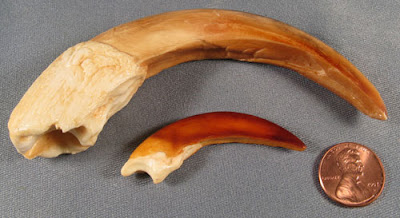 Cymothoa exigua
Cymothoa exiguaCymothoa Exigua, an ocean-dwelling parasite in the pacific ocean, primarily feeds on the Rose Snapper. And that�s not a picture of it being eaten up there. See, Cymothoa Exigua feeds by attching itself to the base of the tongue and draining the blood until it eventually atrophies and falls off. At which point the parasite replaces the tongue - actually functioning as the appendage - thus ensuring that the fish cannot get rid of it without starving to death.
And in other disturbing news: Apparently the Rose Snapper has my grandpa's teeth.
It's the only parasite that actually replaces a body part in its host, and apart from making fishing trips rather disturbing when one finds themselves trying to remove a hook from the mouth of the monster from Aliens, it also sets a terrifying bar for all the other parasites out there. I'm not saying that this trend will continue, or that you can expect to find your penis replaced by segmented translucent millipede in the near future, I'm just saying that if that does happen, you should probably run to the doctor immediately, provided that your legs have not been replaced by tapeworms in the interim.

 Vampire Moth
Vampire MothThis is the Vampire Moth, and it doesn�t need a lot of explaining. It is a moth that sucks your blood. And that is terrible. You worry about bloodsucking from mosquitoes, leeches, and lawyers, and now you have to worry about it from moths too? No longer can you say �don�t worry, honey, it�s just a moth!� and be the brave soldier for your loved ones. No, now you're the one screaming "vampire!" and then hiding under your bed with a cross everytime you see a butterfly.
They�re a recently discovered species, and the blood-sucking mechanism is considered a �logical evolution� from the fruit piercing mechanism present in many other moths. Take note: Everything that eats fruit is going to "logically evolve" into a vampire. I didn�t fucking say that; that�s science. Take it up with them.

 Hatchet Fish
Hatchet FishThis is the Deep Sea Hatchetfish, so named for the hatchet-like body shape. It grows to about four inches in size, and like most deep sea creatures, it is bioluminescent. Unlike other deep sea dwellers, however, the hatchet fish has the unique ability to deeply unsettle you for the rest of your years by simply turning to face you:
Whereupon it ceases to be a fish and instead becomes a phantom escaped from the Room of Lost Souls, here to haunt the living out of jealousy for their flesh., While objectively I know that the Deep Sea Hatchetfish makes no particular sound, I swear to god that I can hear that thing screaming right now, and I�m pretty sure I only have 7 days to live because of it.

 Sydney Funnel Web Spider
Sydney Funnel Web SpiderThe Sydney Funnel Web Spider hails from the land of the Plagued Mother Of Horrors - The Kingdom of the Queen of Monsters, The World of Ancient and Unspeakable Horror - where old and terrifying gods sleep eternally, breathing their noxious miasma of choking fear across this world:
 The land of Australia.
The land of Australia.It�s one of the deadliest spiders in the world, and unfortunately that old adage �it�s more afraid of you than you are of it,� does not apply to the Syndney Funnel Web Spider: It�s not fucking afraid of you at all. It�s infamous for being one of the most �notoriously aggressive� species, and it will attack immediately when provoked. So no, it�s not "more afraid of you than you are of it," unless you�ve suffered head trauma that has rendered you functionally incapable of registering fear, or are Daredevil.
The venom of the Syndney Funnel Web Spider can kill you quite painfully within 40 minutes, and since you can find the males wandering incessantly during the summer months, frequently living in garages, yards, and houses all around Sydney, it probably will. Smashing it is ill-advised, because it's got little spider rage issues and if you miss, it will probably come after you like Mel Gibson in Payback. But drowning is also not a good idea: The Syndney Funnel Web Spider can survive a full day immersed in water, and are also frequently found in swimming pools.
So hey, vacation in Australia! If you�re too scared of sharks to go in the ocean, take a dip in the pool where you only have to risk the word�s most deadly, snorkeling, furious spider.

 Giant Anteater
Giant AnteaterThe Giant Anteater, as anybody with reading comprehension skills can tell you is both giant and an anteater. It's found mostly in central and southern America, and it�s quite cute in a fucked-up-elongated-face kind of way, like Sarah Jessica Parker. Not so cute? These things:
That�s the claw of a giant anteater laid next to the claw of a Velociraptor. You remember Velociraptors, right? From Jurassic Park? There was that really scary speech about how they use these enormous claws to disembowel you, remember? Yeah, the giant anteater is just like that , except for one thing:
The top claw up there � the bigger one � that�s the anteater.
It uses these god damn gigantic claws to kill jungle cats, which are its only natural predator. It can swipe quite rapidly, using a sweeping scythe-like motion to slash at predators or, if cornered, will grab enemies in a �bear hug,� and squeeze the claws through their body. So is it still adorable now that you know it�s basically an Iron Maiden for jaguars?
 Share this:
Share this:
0 comments
Post a Comment